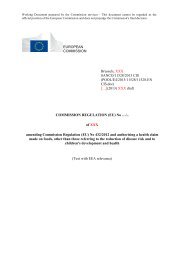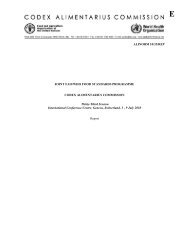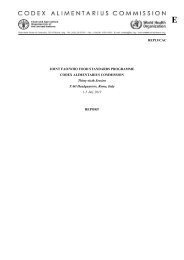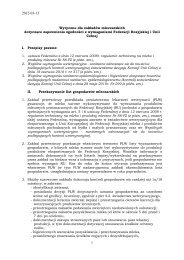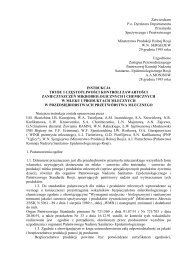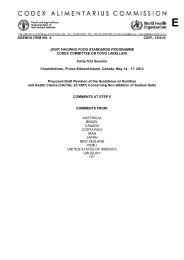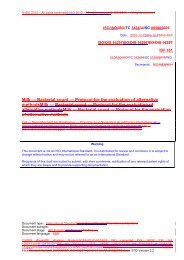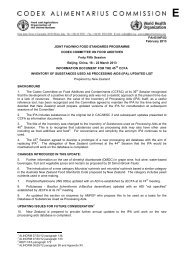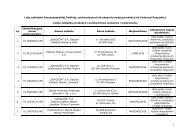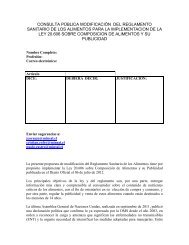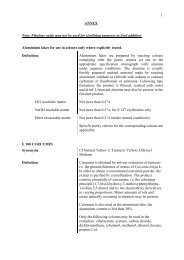ALINORM 03/32 - CODEX Alimentarius
ALINORM 03/32 - CODEX Alimentarius
ALINORM 03/32 - CODEX Alimentarius
You also want an ePaper? Increase the reach of your titles
YUMPU automatically turns print PDFs into web optimized ePapers that Google loves.
REP 13/FA 18<br />
should no longer be used in future provisions of the GSFA. The Committee further recalled that the use of<br />
Note 161 was in itself the result of a compromise to advance food additive provisions in the Step Procedure.<br />
However, the application of the Note to food additive provisions in the GSFA might require consideration on<br />
possible ways to reduce its use, especially in future for those additive provisions that had been put on hold<br />
pending the resolution of this issue.<br />
146. The Delegation of the European Union noted that the discussion paper accurately reflected the views<br />
of all parties on the issue of the use of Note 161. The European Union Member States indicated they could<br />
consider some of the options set out in the paper but that they strongly opposed to the deletion of the Note.<br />
However, the Delegation expressed its willingness to consider the use of the Note on a case by case basis<br />
as it would be difficult to have a general debate on the use of Note 161 in the GSFA without taking into<br />
consideration the specific cases the Note was associated with. In the spirit of compromise, the Delegation<br />
indicated that a starting point could be to examine the provisions associated with Note 161 in the document<br />
(Appendix 8 of CRD 2), which compiled new provisions, provisions already included in the Step Procedure<br />
and adopted procedures for acesulfame potassium (INS 950), aspartame (INS 951) and aspartameacesulfame<br />
salt (INS 962). Depending on the outcome of this exercise, further consideration could be given<br />
on how the application of Note 161 to adopted food additive provisions in the GSFA could be addressed.<br />
147. The Delegation of Costa Rica supported the approach presented in the study to eliminate reference to<br />
national legislation and supported option (ii), which was in line with the position taken by the 18 th Session of<br />
the FAO/WHO Coordinating Committee for Latin America and the Caribbean (CCLAC), as presented in<br />
CX/FA 13/45/2. The Delegation noted that the evaluation of the use of Note 161 could be done on a case by<br />
case basis, should be based on scientific grounds in light of the Preamble of the GSFA and should be<br />
completed within a defined timeframe with a view to no longer applying the Note in the GSFA.<br />
148. Many delegations supported option (ii) and the consideration of Note 161 on a case by case basis.<br />
Some of these delegations also noted that such evaluation should be based on scientific grounds.<br />
149. The Delegation of the European Union noted that all the criteria in Section 3.2 of the Preamble to the<br />
GSFA should be used to conduct this exercise, including ensuring that consumers are not mislead. This view<br />
was supported by the Delegation of Norway. The Delegation of the European Union also indicated that it<br />
could agree with reducing the use of Note 161 in the GSFA and reiterated its willingness to start working on<br />
the revision of the compiled provisions in Appendix 8 of CRD 2 as an initial step to move towards the<br />
achievement of consensus on this matter. In addition, in the interests of following a consistent approach in<br />
the adoption of provisions in the GSFA, other similar provisions, not currently associated with Note 161 in<br />
this document, will be considered once the issue of the use of Note 161 has been addressed.<br />
150. The Observer of NHF supported retention of Note 161 in the GSFA.<br />
Conclusion<br />
151. Based on the above discussion the Committee agreed to establish an electronic Working Group led by<br />
the United Kingdom, open to all Codex members and observers and working in English only.<br />
152. The Committee agreed that the Working Group will identify concerns regarding the provisions with<br />
Note 161 attached, as contained in the compilation document on the use of sweeteners in specific food<br />
categories and the reasons for these concerns (Appendix 8 of CRD 2). Information should be provided to the<br />
Working Group which will be used, in conjunction with the principles set out in Section 3.2 of the Preamble of<br />
the GSFA, to explore the use of alternative Note(s) or other approaches that could address the concerns<br />
which have resulted in the application of Note 161, or to demonstrate that Note 161 is no longer needed for<br />
the particular provision. The Working Group could make recommendations in relation to proposed new<br />
sweetener provisions, those in the Step Procedure and adopted provisions, associated with Note 161, as<br />
listed in Appendix 8 of CRD 2, subject to the submission of relevant data as per Section 3.2 of the Preamble.<br />
153. The Committee noted the offer of the United States of America to assist the Chair of the Working<br />
Group in its endeavour. The Committee encouraged Codex members and observers to actively participate in<br />
the Working Group with a view to facilitating progress in the consideration of Note 161.<br />
DATE AND PLACE OF THE NEXT SESSION (Agenda Item 10)<br />
154. The Committee was informed that its Forty-sixth Session was tentatively scheduled to be held in China<br />
in one year time. The exact venue and date would be determined by the host Government in consultation<br />
with the Codex Secretariat.



